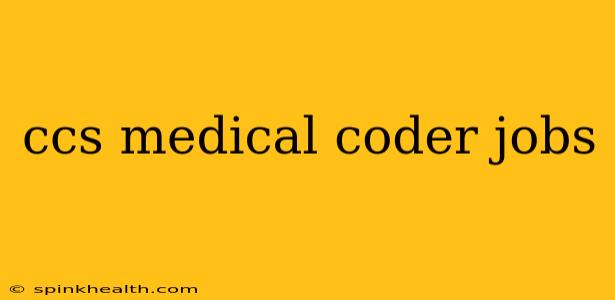Cracking the Code: A Day in the Life of a CCS Medical Coder
The hum of the office, the gentle click-clack of keys, the quiet concentration—this is the world of a CCS (Certified Coding Specialist) medical coder. It's a world often unseen, yet absolutely vital to the smooth functioning of the healthcare system. If you're curious about a career as a CCS medical coder, let's delve into a typical day, explore the required skills, and address some frequently asked questions.
Imagine yourself, Sarah, a seasoned CCS medical coder at a bustling hospital. Her day begins with a steaming cup of coffee and a quick review of her assigned patient charts. Each chart is a story, a medical narrative filled with diagnoses, procedures, and treatments. Sarah's job is to translate this narrative into a precise, standardized code—the universal language of medical billing and reimbursement. This isn't simply about numbers; it’s about ensuring accurate payment for the services rendered, allowing hospitals and clinics to continue providing crucial care.
What Does a CCS Medical Coder Do Daily?
Sarah's day is a blend of meticulous detail and analytical thinking. She starts by carefully reviewing each patient's medical record, including physician notes, lab results, and imaging reports. She meticulously identifies the correct ICD (International Classification of Diseases) codes for diagnoses and the CPT (Current Procedural Terminology) codes for procedures. Accuracy is paramount; even a small error can lead to claim denials and financial complications.
Throughout the day, she utilizes her extensive knowledge of medical terminology, anatomy, and physiology. She consults coding manuals, constantly updating her skills with the latest coding guidelines and regulatory changes. The healthcare landscape is dynamic, and continuous learning is essential for success. She also interacts with other healthcare professionals, such as physicians and billing specialists, to clarify information and ensure coding accuracy.
What Skills Do You Need to Become a CCS Medical Coder?
To thrive in this role, like Sarah, you'll need a blend of hard and soft skills.
- Strong analytical skills: You need to be able to decipher complex medical information and apply the appropriate codes.
- Attention to detail: Accuracy is non-negotiable in medical coding. One wrong digit can have serious consequences.
- Medical terminology proficiency: A deep understanding of medical terminology is essential for accurate coding.
- Knowledge of ICD and CPT coding systems: This is the foundation of your work.
- Computer literacy: Medical coding involves using specialized software and electronic health records (EHRs).
- Communication skills: You’ll need to interact with physicians and other healthcare professionals to clarify information.
- Problem-solving skills: You will often encounter complex or ambiguous cases that require careful analysis and creative problem-solving.
How Much Do CCS Medical Coders Make?
The salary of a CCS medical coder varies based on experience, location, and employer. However, it's a field that offers a stable career path with competitive compensation. Many coders find the blend of intellectual challenge and contribution to patient care deeply rewarding.
What Education and Certification is Needed to Become a CCS Medical Coder?
Most employers prefer candidates with a formal education in medical coding or a related healthcare field. The CCS credential from the American Academy of Professional Coders (AAPC) is a highly respected certification that demonstrates a coder's competency and professionalism.
Is a CCS Certification Worth It?
Absolutely! A CCS certification significantly enhances job prospects and earning potential. It demonstrates your commitment to professional excellence and mastery of the coding field.
What is the Job Outlook for CCS Medical Coders?
The job outlook for CCS medical coders is excellent. With the increasing complexity of healthcare and the growing reliance on electronic health records, the demand for skilled medical coders continues to rise.
Sarah's day ends with a sense of accomplishment, knowing that her meticulous work contributes directly to the financial health of her hospital and, ultimately, to the care provided to patients. It's a career that demands precision, skill, and dedication—but also offers a meaningful contribution to the healthcare landscape. If you're detail-oriented, possess a strong analytical mind, and have a passion for healthcare, a career as a CCS medical coder might be the perfect fit for you.

